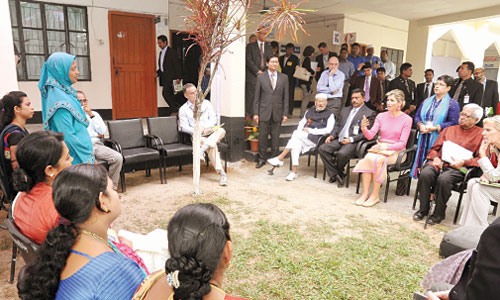Bangladesh still needs to do a lot for financial inclusion: Máxima
Appreciating Bangladesh’s progress in terms of financial inclusion, Dutch Queen Máxima on Tuesday said the country still needed to do a lot to ‘accelerate’ financial inclusion bringing unbanked poor people under financial services.
‘We still have a lot of progress to do. That’s the reason why I’m here. Potential (for further growth) is there but a lot has been done,’ she told reporters while responding to a question from the UNB.
The Queen, who is in Dhaka in her capacity as the UN Secretary-General’s Special Advocate for Inclusive Finance for Development, also said the salaries of garment
workers were being paid by bKash, a full-scale mobile phone-based payment switch in Bangladesh or money being sent to villages through digital account under Union Digital Centres.
‘This was not really possible before. I think these are good and new innovations; and technology has made this possible,’ said the Dutch Queen.
Citing climate change vulnerability and other accidents, she laid emphasis on ensuring poor people’s access to insurance, bank account and access to credit. ‘It’s very important that people are insured and have access to loan and savings facilities.’
Máxima mentioned that still a lot of people in Bangladesh do not have a bank account or digital account through which they can send money safely to their relatives.
The Dutch Queen said bank branches in rural areas could be very expensive but digital finance system still had potential to grow a lot. ‘We need to make it (bringing people under finical services) possible for everybody in Bangladesh. Through ensuring insurance, loans and more savings facilities for them, we can give poor people better and easier life.’
Asked about the comparison with other South Asian countries, she said making comparison is very difficult financial system is different each country. ‘We can learn from other countries. But A2I is a very good example that can be followed by other countries.’
Earlier, she visited Gazipur’s Rajabari Union Digital Centre under A2I project, Viyellatex Group garment factory, had talks with beneficiaries of One Farm One House project and met Jharna Islam, SME client of BRAC.
In the garment factory, the Queen listened to top officials on how employees, especially the female workers, are being benefited through financial inclusion initiatives. She also visited a floor of the factory and witnessed its production process.
The Queen explored the experiences and needs of low-income customers such as garment workers who are paid digitally.
BRAC founder and chairperson Fazle Hasan Abed, Bangladesh ambassador to the Netherlands Sheikh Muhammad Belal, Dutch ambassador in Dhaka Leoni Margaretha Cuelenaere, UN resident coordinator in Dhaka Robert Watkins, programme coordinator, Digital Financial Inclusion, A2I Programme Tohurul Hasan were, among others, present.
Chairman and CEO of the group Rezaul Hasanat, vice-chairman Ahasan Kabir Khan and FCO Wahed Azizur Rahman briefed her about the factory and CSR activities and initiatives taken for ensuring corporate and economic sustainability.
The Dutch Queen arrived in Bangladesh on Monday morning on a three-day visit. The visit, at the invitation of Bangladesh government, is part of Queen Máxima’s global efforts to raise awareness and foster action towards financial inclusion for everyone.
Access to financial services is an important tool to reduce poverty, boost economic development, empower women and achieve other development goals as acknowledged in the recently adopted 2030 sustainable development agenda.
Building on Bangladesh’s significant efforts, the visit will focus on various priorities, including the strengthening of the microfinance sector and advancing mobile financial services for financially excluded populations and SMEs.
- See more at: http://newagebd.net/176327/bangladesh-still-needs-to-do-a-lot-for-financial-inclusion-maxima/#sthash.V3IxS1wX.dpuf











